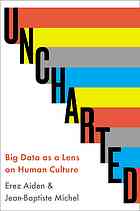
Uncharted
Big Data as a Lens on Human Culture
کتاب های مرتبط
- اطلاعات
- نقد و بررسی
- دیدگاه کاربران
نقد و بررسی

March 31, 2014
Aiden and Michel gained widespread media attention when they first demonstrated their innovative use of the Google Books project, which made available more than 30 million books in digitized formâabout one in every four books published. This "big data" is at the core of this fascinating glimpse into the pair's decade-long work and how "n the coming decades, personal, digital, and historical records are going to totally transform the way we think about ourselves and the world around us." Using a new scientific tool specially designed to be used with Google Books, the Ngram viewer, the pair were able to count words for "track certain kinds of cultural change over time" and to make "careful measurements that probe important aspects of our history, language, and culture." The result is like using a new kind of telescope that allows one to see more closelyâand accuratelyâthe evolution of words and how this reflects cultural change. A long appendix of charts provides a range of fascinating Ngram-based insights as wellâsuch as the fact that the word "data" over the past hundred years has become more commonly used than the word "God."

November 15, 2013
The story of a remarkable scientific tool that uses big data sets to examine cultural trends in human history. In this debut, Aiden (Genetics/Baylor Coll. of Medicine) and Michel, founder of data science company Quantified Labs, describe research with big data that led to their teaming up with Google to develop the Ngram Viewer, an online tool that searches more than 30 million digitized books to reveal how words and phrases have been used over time. Launched in 2010 as part of Google Books, the viewer's search of ngrams (letter combinations) serves the needs of lexicographers and historians while providing endless diversion for others. Calling Google's digitized data "an unprecedented precis of humanity's cultural record," the authors show how such data can be made to reveal important changes over time, from when the early expression "the United States are" gave way to "the United States is" to how censorship can cause the sudden disappearance of particular words and phrases, such as "Tiananmen Square." Having met at Harvard, the authors began seven years ago to experiment with their new scope on historical trends to learn how English grammar changes, how people get famous, and how societies learn and forget. While recounting the copyright, privacy and other issues they faced in developing their tool, they offer fascinating insights into how dictionaries work, the half-lives of irregular verbs and the most famous people of the last two centuries (Hitler heads the list). In an appendix, some two dozen charts graph the relative frequency of use of certain words, such as "London" and "New York," since 1800. (New York began its ascendancy in 1911.) The authors also consider the moral issues raised by the prospect of a future in which personal, digital and historical records reveal more and more about human experience. A fun, revealing exploration of a new way to view the past.
COPYRIGHT(2013) Kirkus Reviews, ALL RIGHTS RESERVED.

December 1, 2013
In late 2010, Google released an intriguing new tool, the Ngram Viewer, allowing users to search the site's archive of five-million digitized books (now there are more than 30 million) for common words and phrases and graph their usage frequency along a timeline. While at first glance the application appears a tad gimmicky, its usefulness in tracking cultural trends across decades and centuries is mind-boggling. In this user-friendly demonstration of Ngram's versatility, Rice University computer science professor Aiden and Quantified Labs founder Michel showcase the results of their explorations using the statistical search engine. With trillions of words in many languages at their disposal, the pair reveals a wealth of historical nuggets, such as noting the huge impact Nazi oppression had on blotting Jewish names from WWIIera books and the sudden, ubiquitous use of Martian when Percival Lowell saw canals on Mars in 1895. Although the volume is somewhat top-heavy with graphs and numbers, even math-phobic readers may glean some fascinating sociological tidbits and be seduced into trying out Ngram.(Reprinted with permission of Booklist, copyright 2013, American Library Association.)

July 1, 2013
Harvard Society Fellow Aiden and Harvard University scientist Michel, recently named one of Forbes's "30 under 30," here address a hot topic: mining big data. Wondering what all those data on all those servers worldwide could tell us, they joined with Google to build the Ngram Viewer, a web-based tool that can chart words throughout the Google Books archive. The one million-plus queries run through the viewer since 2010 reveal startling cultural patterns on everything from how languages change over time to how art has been censored. Not just for geeks.
Copyright 2013 Library Journal, LLC Used with permission.

























دیدگاه کاربران